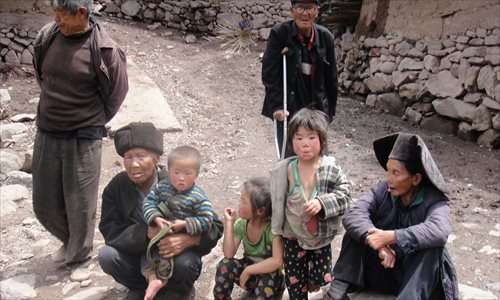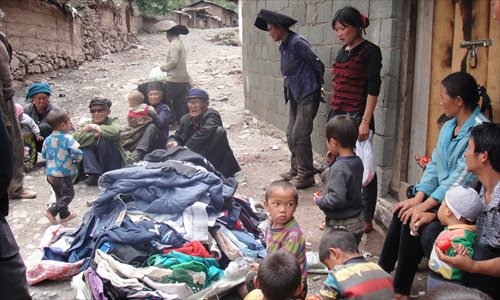Neighbors of outcasts
Discrimination still plagues leprosy victims in rural China

Residents of Qianjin, a Yi ethnic village established in late 1950s as a leper colony, wait for a charity to distribute vegetables and clothes on June 17 in Xide county, Liangshan Yi Autonomous Prefecture, Sichuan Province. Photo: Huang Jingjing

Qianjin villagers surround a pile of donated clothing on June 17. Photo: Huang Jingjing
In June, I spent a week in rural villages in Liangshan Yi Autonomous Prefecture, Sichuan Province, conducting interviews for my story about leprosy sufferers and the social exclusion of their children.
Leprosy remained an incurable and highly-contagious disease until the 1980s, when multidrug therapy was developed which, along with early diagnosis, could cure the disease.
Despite these advances, most rural residents adhere to the outdated stigma of what was previously a little understood disease. My parents are among them. When I told them I was headed to "leper villages," they were shocked and confronted me, asking, "Why? Why you?"
I was expecting their reaction. My family hails from a small village in Hunan Province. Since childhood my parents, just as those of my fellow playmates, told me not to play with the kids of a certain neighbor. We were never to step into their house.
The reason, they said, was that the neighbor's grandpa died from a horrible disease. That disease was leprosy, and the villagers believed it to be not only highly contagious, but also hereditary.
While mobile Internet access stretched to the countryside and health awareness improved, fears of leprosy persisted.
As a result, the neighbor's elder son remained an outsider in the community. Now 36 years old, he is still single, because no one is willing to marry their daughter to his family.
Before preparing for the interview, everything I knew about the disease mainly came from my parents. It was only after my preliminary Internet research and consulting with medical experts that I realized how wrong my parents and my neighbors were.
Needless to say, I had a serious talk with my parents. After telling them about the low infection rate and medical advances, as well as the discrimination and mistreatment of sufferers, they were both relieved and embarrassed.
I soon set off for Sichuan, and my interviews in Liangshan went smoothly. I talked with NGO workers, leprosy sufferers, their children and school teachers. My story, "Inherited affliction," which appeared June 25 in the Global Times In-depth section, was well received. The NGO workers said I was one of a handful of journalists to do field interviews. My parents smiled when I showed them the published story, though they couldn't read English.
The stigma against leprosy is a result of ignorance. Though the livelihood of rural residents may have improved greatly in recent years, old prejudices remain.
But I believe the society is making progress in overcoming these stereotypes. As an increasing number of volunteers, charities and teachers reach these villagers in Sichuan, local residents are beginning to change their attitudes.
During a visit to Qianjin village in Xide county, Liangshan, I came across four Christians from Shandong and Hebei Provinces who came to donate food and clothes.
It was their second trip to the village, but this trip they noticed a small yet important change.
The local driver they hired, who last year refused to enter the village for fears of infection and dropped them off nearby, had dropped them off right in the center.